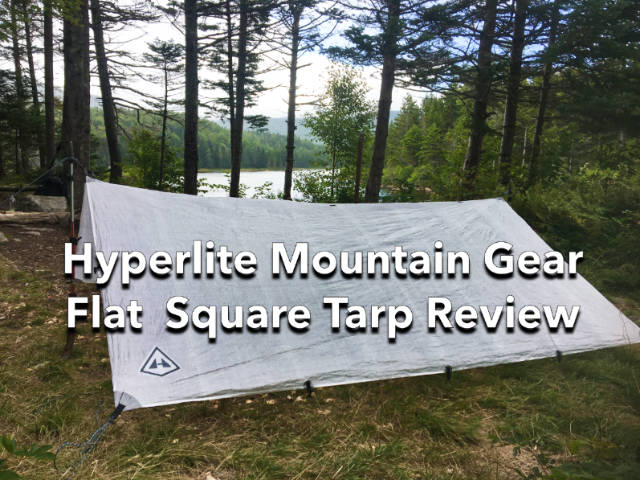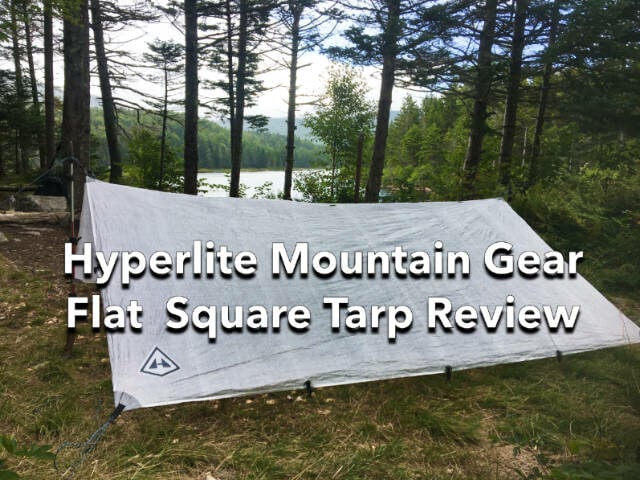The Hyperlite Mountain Gear (HMG) 8’6” x 8’6” Flat Tarp is a flexible, sturdy, and waterproof tarp manufactured from Dyneema Composite Cloth, weighing solely 9 oz/ 255 grams (an 8′ x 10′ mannequin can be obtainable). It has a ton of tie-outs for pitching it in many various methods, and all the perimeter tie-outs use Lineloc tensioners to make tightening the guylines fast and straightforward. It’s costly, however in the event you’re on the lookout for a premium high quality, well-constructed, sturdy, ultralight tarp that may fulfill many duties, it is a sturdy contender.
Specs at a Look
- Tarp Weight (producer): 8.85 oz/ 251 grams
- Tarp Weight (examined) 9.0 oz/ 255 grams
- Stuff sack weight (examined): 0.3 oz/ 8.5 grams
- Guyline weights (examined): every 4 foot guyline: 0.1 oz/2.8 grams; every 6 foot guyline: 0.2 oz/ 5.7 grams
- Dimensions: 8’6” x 8’6” sq. / 2.59 x 2.59 meters (additionally obtainable in 8’ x 10’/ 2.59 x 3.05 meters)
- Tarp Materials : 0.8 oz/sq. Yd. / 26 g/sq. meter Dyneema Composite Cloth
- Ridgeline Seam development: Totally Bonded (not sewn)
- Colour: White (Spruce Inexperienced is out there in the identical weight for an upcharge)
- Tensioners: Linelocs
- Tie-outs: Sixteen(16) Lineloc-equipped perimeter tie-outs, plus 5 (5) on the tarp physique and two (2) sewn in D-rings for attaching a bivy or nest underneath the ridge line
- Included: Guylines: 10 guylines, six 4’ / 1.2 meters and 4 6’/ 1.8 meters lengths. UHMWPE core, 2.8 mm line, non-reflective, stuff sack.
- For full specs see the Flat Tarp web page at Hyperlite Mountain Gear
Why a Tarp?
A tarp tends to draw two sorts of customers. One is completely content material to pitch it in an A-frame each night time and makes use of it due to its low weight and connection to nature. I’ve witnessed unimaginable sunrises the second I opened my eyes from underneath a tarp that I wouldn’t have seen from inside a tent.
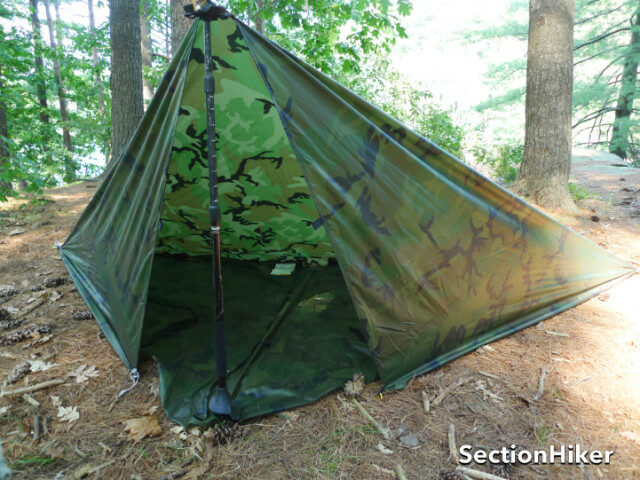
The opposite is a tinkerer, who sees a flat tarp as a sheet of origami, whose shapes are solely restricted by their creativeness. They prefer to play and can observe within the yard or the native park with numerous shapes earlier than heading out into the woods. They’re excited to have the information and expertise to tailor their pitch precisely to the circumstances they face–from excessive and breezy when protection wants are minimal to buttoned-up full protection for a storm.
Why Flat?
The primary person above is likely to be extra content material with a catenary-cut tarp. A “cat-cut” curve on the ridgeline approximates the sag of gravity and thus permits you to pitch it drum tight. Typically the sides are additionally cat-cut to have the ability to pull them additional tight. These tarps are extra restricted by way of pitching choices for the reason that pitch must reap the benefits of the catenary curve, however they’re straightforward to make use of.

The second person appreciates the advantages of a flat tarp. Since these tarps don’t have catenary curves, they are often more durable to pitch drum tight, however they’re much extra versatile by way of the potential shapes you’ll be able to create with them. The HMG Flat Tarp is such a tarp–fully sq. and flat, with no catenary curves both on the ridgeline or the sides.
Whereas it really works nice as a standalone shelter (all the time paired with a bug-net in the event you’re in tick nation like me), its flexibility permits it to be adaptable to many various situations for numerous journeys: a hammock tarp, an overhead shelter to get out of the rain throughout a canoe journey, a cooking and eating fly for household tenting, a entrance porch in your tent, and so on. It’s gentle sufficient to take as a solo shelter however sufficiently big for 2 individuals (so long as you’re not a lot over 6’ tall).
Building
The HMG Flat Tarp is constructed with 0.8 oz/ sq. yd Dyneema Composite Cloth (“DCF8”), the identical materials utilized in HMG’s Echo and Ultamid shelters. A hem is sewn across the perimeter of the tarp, however the ridgeline is absolutely bonded–no stitching.
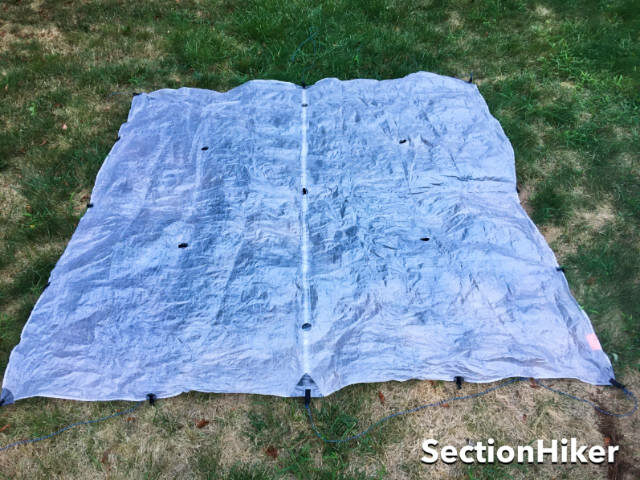
There are a ton of tie-out factors on the tarp, together with:
- 16 Lineloc tensioners sewn across the perimeter, 5 on both sides (in the event you’re doing the mathematics, keep in mind the nook guy-outs every depend for two sides) with bonded reinforcement patches
- A tie-out within the very middle of the tarp, with a small round reinforcement patch
- 4 mid-panel tie-outs with small round reinforcement patches. Should you think about the tarp pitched as an A-frame (like within the picture on the high of the article), there’s a midpoint tie-out at one-third and two-thirds the size of the tarp on both facet. You possibly can connect guylines right here and stake them out to create extra room underneath the tarp.
- On the underside of the tarp alongside the ridgeline, there are two D-rings connected through webbing and small round reinforcement patches to rig up bug netting or a bivy.
The D-rings are situated to pair with an Echo II Insert, however you’ll be able to rig up any internet tent or bivy to them. And, if you’re sleeping 2 individuals beneath the tarp, since DCF is a sandwich of Dyneema between 2 sheets of Mylar movie, I don’t see any cause you couldn’t flip it over so the location of the mid-panel tie-outs would work higher on the underside of your tarp–as tie-out factors for 2 bivy sacks above the heads of every individual to carry the bivy netting off their faces. It simply makes the usage of the Linelocs considerably extra awkward.

The development is powerful. Along with the reinforcement patches, the perimeter tie-out webbing holding the Lineloc tensioners are every sewn with three bartacks to the tarp, and a fourth on the ribbon itself. I’m assuming this fourth bartack is to take the impression of rigidity from the guyline earlier than the stitches on the tarp itself do.
Man-out Factors and Guylines
It’s uncommon to want to guy-out all 16 factors on any specific pitch, so HMG contains 10 UHMWPE-core guylines of 4’ (6 depend) or 6’ (4 depend) so that you can add to the Linelocs the place you want them. Sadly, just a few acquired misplaced sooner or later so I solely have 6 of the unique guylines left. The guylines are blue and white striped however shouldn’t have any reflective tracer woven in.

The included guylines are just a little brief for some pitches, so you could wish to buy extra 2.8 mm line and lower it to the lengths you most want. HMG sells a roll of fifty toes of the guyline they use on this tarp right here in order for you your extras to match, however you will discover guyline from a lot of completely different distributors.
Packing
Being DCF, the HMG Flat Tarp is low weight (solely half a pound) however considerably bulkier than a similarly-sized silnylon or silpoly tarp. We suggest folding and rolling DCF shelters as a substitute of stuffing them into their stuff sacks to assist protect their longevity.

The stuff sack can appear small, however I discovered that once I stored folding the tarp in half till it was about 8 inches vast (and eight.5 toes lengthy) I might roll it up and it match simply. Should you fold and roll it rapidly or sloppily, it received’t come near becoming. However usually I’ll depart the stuff sack behind and simply fold and roll, weaving the guylines left and proper throughout the tarp as I roll to maintain them from tangling, and put it immediately into my pack.
DCF doesn’t stretch or sag when moist (although it will probably deform when underneath numerous uneven rigidity) and it doesn’t take up water, so in the event you pitch it tight, it ought to keep tight. Within the morning, give the tarp shake or wipe it down with a bandana or a small piece of sponge sheet and also you received’t be carrying extra water weight with you.

Listed here are some fast ideas for tenting with the HMG Flat Tarp:
For the reason that longer your guylines are, the better it’s for them to get tangled, I prefer to maintain the inventory lengths of brief guyline on the tarp and convey the quick-attach guylines from my REI Quarter Dome SL tarp with me. They’ve little toggles that work completely with the stake loops on the HMG guylines to increase the guylines so long as you want.
After I used the HMG as an overhead shelter for cooking for the household within the rain, I strung collectively as many as three of those guylines in succession to have the size I wanted. It was a lot faster than swapping out guylines in camp or knotting guylines collectively and made for a lightning-quick breakdown. To make your personal quick-attach guylines, you may get toggles from Ripstop By the Roll.
Some pitches, like my favourite, the “Tarp Tent” featured right here, use a trekking pole deal with to “increase the roof” and create extra headroom. Whereas some tarps have devoted massive reinforcement panels for this, the HMG Flat Tarp doesn’t, so I attempt to place my trekking pole deal with beneath a small guyout reinforcement patch to forestall deformation or injury to the seam, however this isn’t all the time an possibility as a consequence of location.
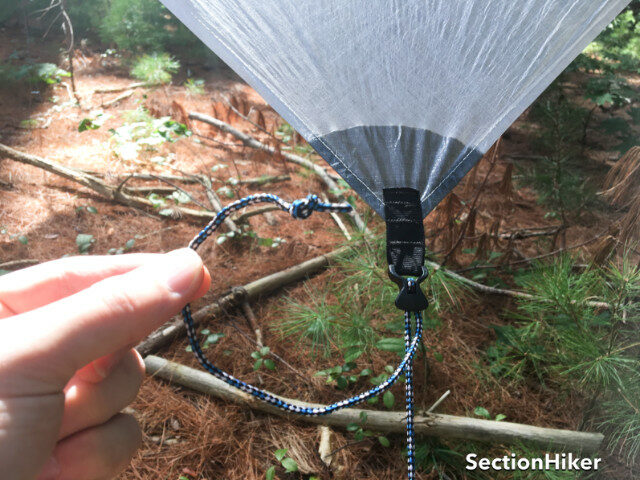
Tie the stopper knot on every guyline comparatively loosely in an effort to undo it–eradicating the stopper knot is critical to have the ability to change guylines from one location to a different.
You don’t want so as to add guylines the place you’re pegging the tarp to the bottom. Simply slip a skinny stake by way of the webbing the linelocs are connected to and twist it a half flip to insert it into the bottom.
Pitching Observe
Pitching a flat tarp is a talent that requires observe to get pitch, particularly the much less intuitive shapes. To actually geek out on this, try our article on Sq. Tarp Pitches and obtain the PDF we’ve linked. Go play, and discover out what shapes you want and underneath what circumstances you would possibly use them. Memorize them by way of repetition so that they develop into second nature. You then’ll have a bunch of potentialities if you attain camp. For starters, listed here are just a few pitches I notably like:
Hammock Tarp

Plow Level/ Diamond

Tent Awning

Tarp Tent (no connection to Tarptent, the corporate)

Comparable Flat Tarps
Suggestion
The Hyperlite Mountain Gear Flat Tarp is an costly tarp, little doubt. However that’s the one con I can discover for it, except you’re a lot over 6 toes tall, wherein case you could wish to go as much as the bigger, rectangular 8’ x 10’ dimension HMG provides. A whole lot of thought has gone into the location of tieouts, the {hardware}, and the strong development. I actually loved the flexibleness and multi-use potential of this tarp, its ultralight weight, and its dependable waterproofness. If the worth will not be a problem for you, it is a incredible tarp that ought to serve you for a few years to come back.
Disclosure: Hyperlite Mountain Gear donated a tarp for evaluate.
In regards to the writer
Greg Pehrson is an ultralight backpacker who was bitten exhausting by the MYOG (make-your-own-gear) bug. He repairs, tinkers, and builds gear, usually in search of to upcycle throwaway objects or repurpose issues from exterior the backpacking world.
SectionHiker is reader-supported. We independently analysis, check, and charge the perfect merchandise. We solely become profitable if you buy a product by way of our affiliate hyperlinks. Assist us proceed to check and write unsponsored and unbiased gear critiques, newbie FAQs, and free mountain climbing guides.

